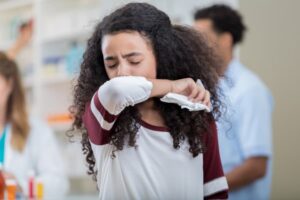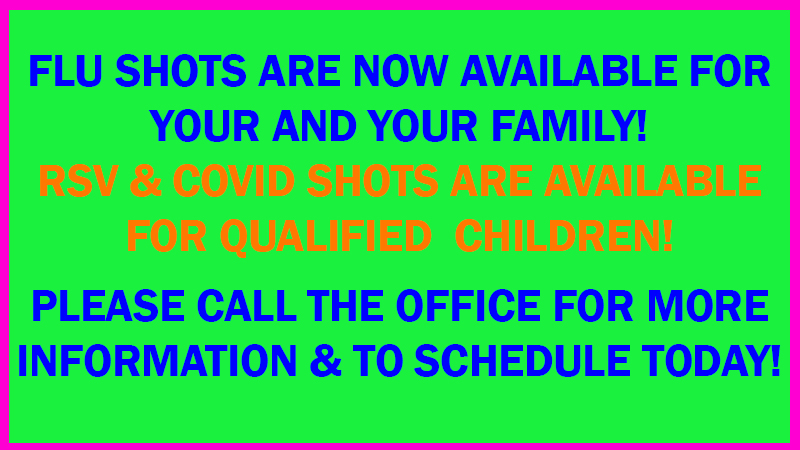 There have been alarming news stories about Enterovirus D68, which is in the same viral family as poliovirus. Outbreaks of this virus can cause widespread respiratory illness, as has been the case nationwide and in New Jersey. Occasionally, Enterovirus D68 can also affect the nervous system, causing muscle weakness. The pediatricians at Touchpoint Pediatrics provide expert care for families and children with viral infections. Headquartered in Chatham, New Jersey, Touchpoint Pediatrics serves patients throughout Morristown, Summit, Berkeley Heights, Hoboken, and beyond.
There have been alarming news stories about Enterovirus D68, which is in the same viral family as poliovirus. Outbreaks of this virus can cause widespread respiratory illness, as has been the case nationwide and in New Jersey. Occasionally, Enterovirus D68 can also affect the nervous system, causing muscle weakness. The pediatricians at Touchpoint Pediatrics provide expert care for families and children with viral infections. Headquartered in Chatham, New Jersey, Touchpoint Pediatrics serves patients throughout Morristown, Summit, Berkeley Heights, Hoboken, and beyond.
Enterovirus D68 in the News
Touchpoint Pediatrics has received calls from concerned families about Enterovirus D68. They have seen news reports of illnesses related to this virus. Aside from respiratory symptoms, a condition named acute flaccid myelitis (AFM) has also been reported. In a very small percentage of children, this inflammation of the spinal cord in the neck may be associated with exposure to Enterovirus D68. AFM is a serious condition and is also very rare. In most instances, children and adults only experience respiratory symptoms related to this virus.
History of Enterovirus D68
This virus is not new. It was first identified in California in 1962. According to Centers for Disease Control and Prevention, non-polio enteroviruses, such as Enterovirus D68, are thought be to very common in the United States, causing either no symptoms or mild respiratory symptoms. While infections may be found all year, they are mostly observed in the summer and fall.
Symptoms of Enterovirus D68
Touchpoint Pediatrics believes that families should be aware of viruses found to be circulating in their communities. During annual wellness visits, pediatricians can discuss concerns about a child’s health and answer questions related to public health. They also offer vaccination information and encourage all pediatric patients to stay up to date. However, there is no vaccine or antiviral medications for Enterovirus D68.
Most pediatric patients who develop Enterovirus D68 infections exhibit cold symptoms, such as:
- Congestion
- Cough
- Runny nose
- Sneezing
- Muscle aches
- Mild fever
Similar to a common cold, the infection will run its course and resolve in a relatively short time. In this way, Enterovirus D68 infection presents symptoms akin to rhinovirus, influenza, RSV, and other respiratory viruses.
A small percentage of children may develop wheezing and have trouble breathing. This is most common in pediatric patients with a history of asthma.
Enterovirus D68 Diagnosis and Treatment
There is no official test available to detect Enterovirus D68. Patients who are sick enough to be admitted to an intensive care unit are being tested for research and surveillance purposes. Eventually, the CDC will release statistics based on these patients, which may be reported by news media. In other words, when Touchpoint Pediatrics examines a child with respiratory symptoms, pediatricians cannot determine whether or not it is caused by Enterovirus D68.
Touchpoint Pediatrics recommends families treat Enterovirus D68 infections as they do other respiratory illnesses with the following remedies:
- Sleeping and resting
- Drinking enough fluids to avoid dehydration
- Monitoring for fever
- Administering saline nose drops or sprays for congestion
- Using a cool humidifier or vaporizer
- Taking soothing baths
- Clearing nasal passages of babies with bulb syringes
If wheezing or trouble breathing is serious or persists, contact a pediatrician. Touchpoint Pediatrics recommends that patients always keep asthma under control by utilizing their prescribed medications.
In addition, parents should make sure their children receive their influenza vaccines every year. Because Enterovirus D68 is a virus, rather than bacteria, antibiotics are inappropriate. They will not help shorten the duration of a child’s illness.
Information, Diagnosis, and Treatments at Touchpoint Pediatrics
All pediatricians at Touchpoint Pediatrics are board certified and provide expert care for families in Chatham, NJ, including Morristown, Summit, Berkeley Heights, Hoboken, and beyond. It is important to be aware of outbreaks and diseases that may affect children.
Touchpoint Pediatrics is dedicated to helping protect public health, and pediatricians stay up to date on research and available new treatments. They follow the progress of Enterovirus D68, as well as other viruses and infections that may affect their patients. Contact Touchpoint Pediatrics today for further questions and concerns.

